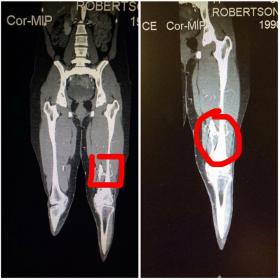Hi guys
I’m writing here because I’ve (pretty much) made my mind up that I’m going to start riding again, however I have some concerns and I’m just not sure my doctor is aware how physically demanding, strenuous, as well as risky horseback riding can be.
Fair warning this is long. I need some support and guidance, and so I’m here. I have an AVM (Arterial Venus Malformation, where my femoral artery and veins became one big glob) and bone tumor in my left femur. The AVM traverses the femur bone itself. The lesion is benign, and is what causes my severe, daily pain, according to the doctors. I’ve been lucky that I am studied at the BVAC (Birthmarks and Vascular Anomaly’s Clinic) at UCSF since I was 13 (now 29 going on 30), and am seen by the top Orthopedic Oncology and AVM Specialist they have to offer. I’ve had outstanding medical recourses, attention, etc. and, the good news is, over the years, according to gradual MR scans, the AVM is reducing in size. The lesion inside the femur is remaining the same, and as such, is what is likely the cause of the pain I have. That and I have pretty much no cartilage in that knee.
I live with a very swollen, enlarged leg with varicosities prominent throughout with discoloration visible to the eye. It used to cause me a lot of self-consciousness but over the years I seem to have learned to embrace it, but it still does bother me. The pain is what gets me.
I was also a competitive horseback rider, showing in the A rated jumpers with a lovely warmblood Holsteiner gelding, eventually schooling consistent coursework at 1m35
I have had a couple Bi Lateral Pulmonary Emboli, once in 2017 and once in 2019, unprovoked. I am on thinners for life. Normally, I would say that being on thinners and riding one would have to assume more caution than normal, but not out of the question. I’m not saying about going back to the level I rode at, I’m talking about walking and trotting around an arena on a very good horse. But, with a bone tumor in my femur, and an AVM, along with blood thinners, I can’t help but question myself if I’m making the right decision in getting back in the saddle. It’s what I love. It keeps me sane. It is practically all I care about. It is who I am. Horses are a part of me. There’s no denying that. I’m so sorry this is so long.
My doctor gave me the go ahead to ride, but I’m not sure if he’s TRULY aware at the dangers of horseback riding. I don’t want to exaggerate, this isn’t a dangerous horse, I’ve owned him almost his entire life, but accidents happen. I seem prone to them. However, it’s my sanity. I haven’t ridden regularly in years but it’s clearly taking a toll on me, I know I would be happier if I could ride again.
How do I tell my doctor that this is a powerful creature that’s not known to be lax in nature? He’s been dubbed a “Ferrari”, though he’s 19 now, he’s still a powerfully built, incredibly talented, get up and go kinda horse. He will take care of me I’m sure, he’s not dangerous and I know how to ride, but there is that part of me that wonders if I’m making the right choice, or if my doctor actually knows the dangers of the sport.

